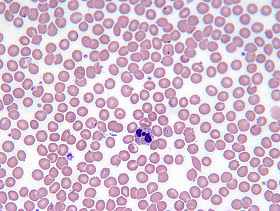 A study among transfused patients in Ghana suggests that while malaria parasites are routinely detected in blood donations in malaria-endemic areas, transfusion-transmitted malaria (TTM) in these locations is uncommon. The study found that 68 (18.2%) of 372 patients with elevated risk of TTM received blood infected with Plasmodium falciparum, as detected by polymerase chain reaction (PCR). Among 50 of these patients who were further evaluated, only 7 (14%) became positive for P. falciparum by PCR during a 14-day post-transfusion period, and only 1 (2%) had genotypically-confirmed TTM. The research team also compared four malaria screening methods (microscopy, rapid diagnostic test, PCR, and enzyme immunoassay), concluding that none of these assays were sufficiently accurate and practical for routine use. In malaria-endemic areas, transfusion patients are often presumptively treated for malaria, and the World Health Organization currently recommends that all blood donations be screened for malaria. However, this study suggests that TTM may be relatively uncommon, and that TTM-related policy should be reevaluated.
A study among transfused patients in Ghana suggests that while malaria parasites are routinely detected in blood donations in malaria-endemic areas, transfusion-transmitted malaria (TTM) in these locations is uncommon. The study found that 68 (18.2%) of 372 patients with elevated risk of TTM received blood infected with Plasmodium falciparum, as detected by polymerase chain reaction (PCR). Among 50 of these patients who were further evaluated, only 7 (14%) became positive for P. falciparum by PCR during a 14-day post-transfusion period, and only 1 (2%) had genotypically-confirmed TTM. The research team also compared four malaria screening methods (microscopy, rapid diagnostic test, PCR, and enzyme immunoassay), concluding that none of these assays were sufficiently accurate and practical for routine use. In malaria-endemic areas, transfusion patients are often presumptively treated for malaria, and the World Health Organization currently recommends that all blood donations be screened for malaria. However, this study suggests that TTM may be relatively uncommon, and that TTM-related policy should be reevaluated.
Reference
